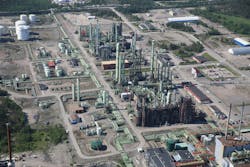Finnish steam cracker to boost olefins production from renewable, recycled feedstocks
OMV AG subsidiary Borealis AG has taken final investment decision (FID) to move forward with a revamp of an existing steam cracker at Borealis Polymers Oy’s integrated petrochemical complex in Porvoo, Finland, to expand the unit’s capacity for production of ethylene and propylene from renewable and recycled feedstocks.
Approved at an overall investment of €4.5 million ($4.9 million), the project will involve modifications to three of the cracker’s 10 furnaces that, once completed, will enable the olefins unit to produce a total 120,000 tonnes/year (tpy) of base chemicals from a feedstock of renewable and recycled materials, Borealis and OMV said on Apr. 9.
Already underway and scheduled for completion in 2025, the project comes as part of the operator’s Borealis Strategy 2030 that—in addition to supporting the goal of achieving net-zero emissions across operations by 2050 in line with the global energy transition—seeks to proactively accelerate the transition to a circular economy through circular use of base chemicals, the company said.
Equipped with current ethylene and propylene nameplate production capacities of 430,000 tpy and 263,000 tpy, respectively, the Porvoo steam cracker predominantly uses a feedstock mix of naphtha, propane, butane, and LPG to produce olefins.
Without disclosing capacity details, Borealis and OMV said the Porvoo complex’s current production of renewable-based and chemically recycled olefins previously secured ISCC System GmbH’s International Sustainability and Carbon Certification Plus (ISCC+) designation, an international certification program that recognizes a company’s responsible approach to sustainable development for circular materials across the supply chain, including advanced recycling processes to recover waste and residues that can be turned into feedstock for circular plastics, chemical intermediates, and consumer-facing products.
In its 2023 annual report, Borealis said its suppliers produce ISCC+-certified hydrocarbons entirely from renewable raw materials, such as waste and residual oils and fats, which the operator subsequently converts into ISCC+-certified cracker products, phenol and acetone, which are ultimately used to produce high-performance plastics and chemical intermediates.
During 2023, Borealis confirmed it contracted for about 36,000 tpy of renewable feedstock during the year, primarily for feedstocks derived from used cooking oil.
Amid a current dearth in renewable feedstock availability at an affordable price that could hinder the operator’s ability to achieve its circularity targets, Borealis said it also further developed its supply chain solutions in 2023 for transporting renewable feedstocks such as biodiesel and biopropane to its production sites in Porvoo, as well as sites in Stenungsund , Sweden), and Kallo, Belgium.
The operator additionally confirmed setting up a dedicated supply chain solution in 2023 for chemically recycled feedstock from its majority owned Renasci NV’s recycling site in Belgium to the Porvoo cracker via a multimodal solution with iso-containers and vessels.
Borealis is targeting production capacity for circular solutions of 600,000 tpy by 2025 and 1.8 million tpy by 2030, according to the latest annual report.
In 2023, the company’s total production capacity for circular solutions was 195,200 tpy, up 32% from 148,000 tpy in 2022. Borealis also processed 116,300 tpy of circular feedstock, down 0.5% from the previous year, the operator said.
About the Author
Robert Brelsford
Downstream Editor
Robert Brelsford joined Oil & Gas Journal in October 2013 as downstream technology editor after 8 years as a crude oil price and news reporter on spot crude transactions at the US Gulf Coast, West Coast, Canadian, and Latin American markets. He holds a BA (2000) in English from Rice University and an MS (2003) in education and social policy from Northwestern University.

